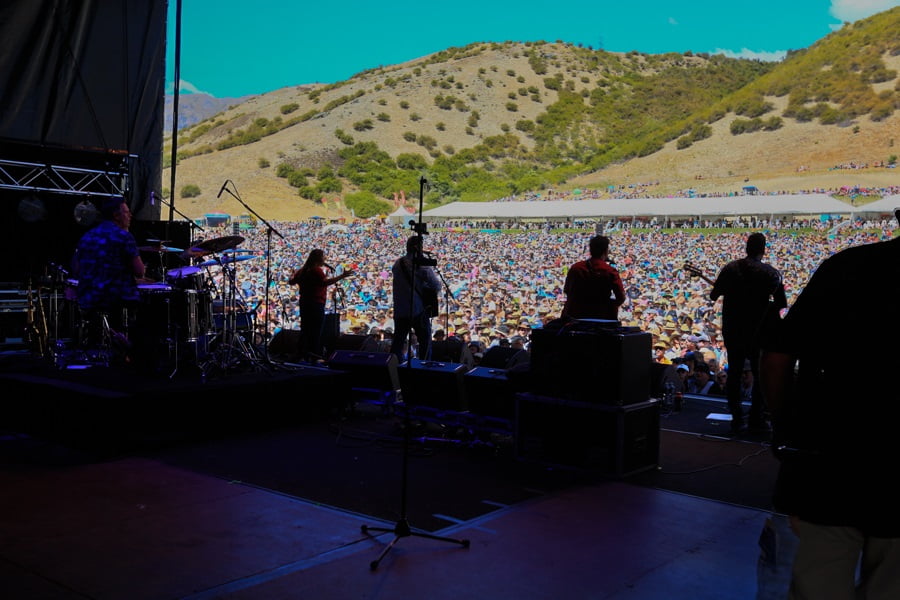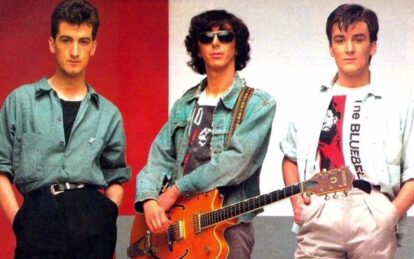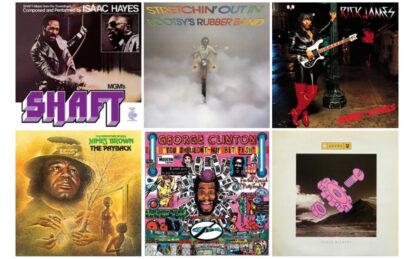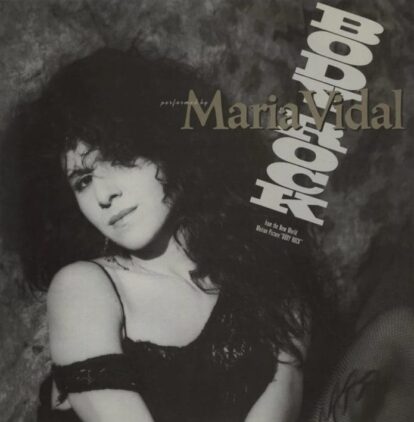Fronted by a Scottish native who relocated Down Under in his teens, Men At Work glimpsed greatness before it all became a bit Spinal Tap. Frontman Colin Hay trawls through a thorny and tragic history with Classic Pop…

Image Credit: Jorge Sayegh
The rise and fall of Men At Work is a tale of friendship forged in music and ruined by conceit, of small-mindedness stymieing big dreams, of what might have been but wasn’t because of that conspicuous human proclivity for self-sabotage.
On the cusp of world domination, the Aussie outfit had scored a brace of American No.1 singles with Who Can It Be Now? and Down Under (the latter also claimed pole position in the UK) and were touring their second platinum-selling album, Cargo, when, in 1983, infighting led to their eventual implosion.
“The original band kind of split into two camps, really,” recalls Colin Hay, the Scottish-born singer now domiciled in Los Angeles.
“There were six people in our band – five musicians and one manager. The rhythm section – the drummer and the bass player – got sacked on that tour. So that left four of us. We made a third album and during that record one day Ron [Strykert, guitarist] just said, ‘I’m going home’. And I said, ‘Oh, are you coming back?’ And he said, ‘Nah, I’m not coming back’”
Hay, born and raised in Saltcoats, North Ayrshire, until his family upped sticks and moved to Australia in 1967, and Strykert first met in Melbourne during 1978, each recognising the other as kindred spirits.
“I was wandering about playing and writing songs, fairly self-contained in that regard. I’d been performing solo for a long time and enjoying that. But I suppose at the back of your mind you’re always looking for somebody to work with. I wanted to put a band together – that was always a dream of mine.
“I met Ron one day in someone’s backyard. He was playing this 12-string guitar and had this beautiful touch. This lightbulb went off in my head. I just knew this was somebody I could have a musical relationship with. I was going off to do a musical and I said to him, ‘When I’ve done that, we should work together, we’ll get something going.’ So I came back and found him again and we started working together.”
They then recruited drummer Jerry Speiser, mercurial multi-instrumentalist Greg Ham and bassist John Rees. This early incarnation of Men At Work established a cult following on the pub circuit before being signed to CBS in early 1981.
By the close of that year they’d taken debut album Business As Usual to the top spot in several territories, the US and Britain among them, and gone global with totemic second single Down Under.
Hay attributes that success in no small part to producer Peter McIan. “He came along and recognised the strength of the songs. He brought them to life in a way that I enjoyed. He pop-ified them, if you like. A lot of them were quite simple songs that had become needlessly complicated by containing everyone’s ideas. When you’re having a crack at being a democratic band you kind of listen to everyone’s ideas, no matter whether they’re good or bad. Peter got rid of a lot of that. He said, ‘These are simple songs, let’s keep it simple.’
“The success that happened, happened incrementally. Looking at it from the outside, it happened very quickly. But everything that happened seemed very logical to me. We always had a strong sense that we were going to be successful.
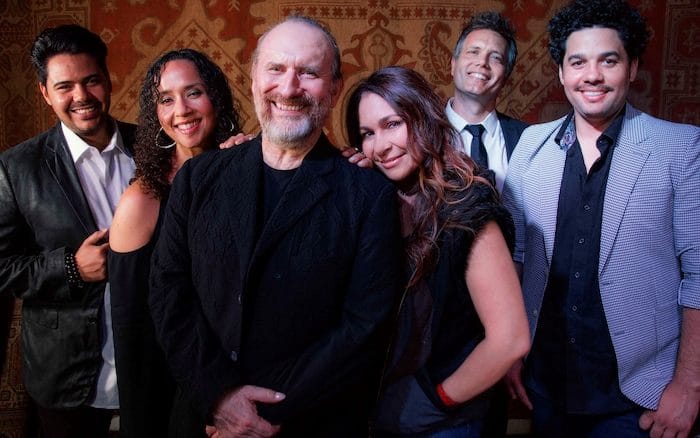
Down Under, of course, remains their apogee, the chorus forever etched in the consciousness of everyone who’s ever heard it – and there can’t be many who haven’t. Hay admits he got “very, very goosebumpy” when they were recording the track.
“Ron used to give me these home demos. They were quite inventive. He had a little bass and percussion piece. He set up these bottles filled with different levels of water in them and he would play these wee bottles as percussion and put a little bassline over the top of it. It was very trance-like. I became obsessed with it and I’d listen to it all the time.
“I’d had these lyrics in my head for a while – ‘Do you come from a land Down Under?’ – and I would sing them over this percussion thing in the car. They just kind of fit. I got excited by that, so I kept doing that for a few hours. The next day I wrote the chord structure and the lyrics, and the track all of a sudden sprang to life.
“We thought, ‘Fuck, this is a strong song.’ It proved to be so.”
Hay finds it weird that Down Under has become to many Aussies, particularly those exiled in London’s Antipodean enclave of Earls Court, a flag-waving anthem.
“The choruses were really more about trying to warn people of the fact that there was a lot of people trying to destroy the uniqueness of the place, whether it is cutting down forests, coastal desecration, not really understanding the indigenous populations of Australia; what had happened to them and continued to happen to them.
“There is a darkness to it. But ultimately it celebrates what’s incredible about the place. I would like to think it’s an inclusive thing as opposed to what’s happening at the moment, where there’s almost like an identity struggle in that part of the world, people trying to figure out who they are. It’s very turbulent.”
Copyright Problems
Just as Down Under represents an apex in Men At Work’s oeuvre, so too, ironically, is it something of a nadir. In 2009, Hay was named in a lawsuit alleging copyright infringement by Larrikin Music, which owns the rights to Kookaburra, a composition penned in 1932. The case centred around the flute riff played by Greg Ham. A judge awarded Larrikin five per cent of royalties dating back to 2002, and the same amount in future royalties. Hay believes the litigation had a devastating effect on Ham, who died in 2012.
“I think that contributed to his passing away. It’s not something I can prove, but I know that it had a big effect on his self-esteem. Greg wasn’t doing too flash at the time anyway. He had a few demons going on there. But he wasn’t sued. I was the one who got sued as one of the songwriters. They wanted to sue Ron as well, but they couldn’t find him! They went for me because I was an easier target.
“But Greg felt immense guilt because he played the line and yet wasn’t sued. So he felt a sense of impotence about not being able to do anything about it, and thought that was how he was going to be remembered.”
Not by Hay, though, who fondly reminisces about “a great, great friend and a great guy”. The two first hooked up as youngsters and would get stoned watching Monty Python together.
“I don’t think Greg ever particularly liked being straight. He loved his pot. He was never a drinker early on, but he did like his mind being altered somewhat. That was the state he much preferred. It just got the better of him over a long period of time.
“And then he started to drink a lot, which was very odd, because it was not something I associated him with when he was younger. I stopped the drink about 27 years ago, so I would have lots of conversations with him about it. He would say, ‘How do you stop?’ We had the same conversations all the time and he always seemed to think he could control it. But those of us who have that particular addiction know how difficult that is.
“As a musician he was great, he was very inspired and instinctive. I remember when he played the solo on Who Can It Be Now?, which is one of the great saxophone solos of all time in pop music. He only played it once. We were in the studio and we were just going to get a sound on the sax. The producer said to Greg, ‘Just play anything.’ So he pressed ‘record’ on the rehearsal take and afterwards said, ‘That’ll do, that’ll be fine.’ It was a genius solo.”
Ham, along with Hay, was the last man standing in Men At Work before the group finally dissolved around 1986. They never really recovered from the divisiveness that had poisoned the 1983 tour. Hay places the blame for the break-up squarely at the door of bandmates Jerry Speiser and John Rees, and their attempts to oust manager Russell Depeller. “Jerry and John didn’t like Russell. They wanted to put him on a wage because they said he wasn’t a real manager. I didn’t want Russell to get sacked or to suffer because of the fact that somebody thought he wasn’t a real manager.”
Speiser proposed that his sister take over Depeller’s role. Hay wasn’t having it.
“Here’s the drummer of the band going up against me. I’m thinking to myself, ‘You’re just essentially giving yourself the sack at some point. This is not going to fly.’
“So at the end of the big American tour I said to Russell I didn’t want to work with this guy anymore and I wanted to leave the band. Then I spoke to Greg and Ron and they didn’t want to work with Jerry and John either. So they ended up getting the sack.”
Hay felt betrayed “in the sense that people didn’t realise that this thing we’d done was bigger than any of us and we should just see it for what it was, see the bigger picture”.
The absurd tableau plumbed even more ridiculous depths when, at various points of their trek across the States, Speiser talked of expelling everyone.
“He wanted to sack Ron at one point because he said he couldn’t tune his guitar quickly enough between songs. I’m sure he would have wanted to sack me as well because I was a fucking alcoholic, but I sang the songs and wrote them, so he figured maybe that was a bit of a stretch.
“The problem was between myself and Jerry, who’s a great drummer, and actually, in retrospect, probably one of the best for the band as well. But he just had a different methodology to me. I felt resented for the fact that I was the one responsible for the songs. I would take a song like Overkill into the rehearsal room and I would get no reaction at all. I’d think, ‘What more do you want? This is as good as it’s going to get!’
“I always wanted to be in a great band. And I think at the end of the day we fell short of that. We glimpsed the greatness of what we could be. Something that should have been a really huge thing was kept small by small-mindedness.”
David Burke
Classic Pop may earn commission from the links on this page, but we only feature products we think you will enjoy.


